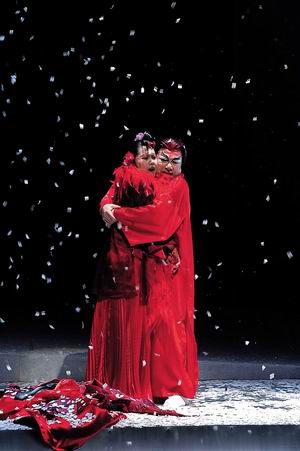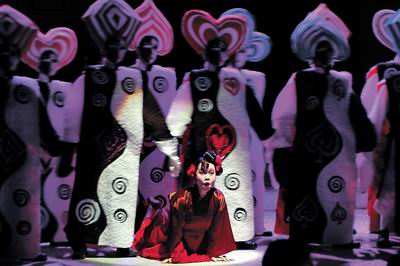

Shanghai Opera House's production of "The Wager," one of the very
few modern Chinese operas to win international acclaim, has been hailed for its
avant-garde stage design and costume.
Shanghai Daily News
"Home" is suddenly a not-so-sweet word when artists from the Shanghai Opera
House stepped onto the stage of Shanghai's Grand Theater on Monday. They were
presenting "The Wager" - their own original avant-garde production - as part of
the Sixth Shanghai International Arts Festival. The cast and crew had just
returned from a successful appearance at the ongoing Seventh Beijing
International Music Festival but once back home, their hopes for a reprise of
the sensation they caused in Beijing went unfulfilled.
As the only Chinese opera house to be invited to the Beijing festival - which
is emerging as China's only world-ranked music festival - the Shanghai company's
tour cost the organizers up to 600,000 yuan (US$72,300), most of which was due
to slashing ticket prices. The cheapest tickets cost only 10 yuan and the low
prices were designed to attract greater audiences to see "The Wager," whose
music and performance style are abstruse to fans of Chinese opera. However, it
was reported that the production was probably the most audience-friendly
performance ever seen in the Beijing Poly Theater.
"As a music festival based in China which aims to become the professional
summit for musicians from all over the world, we take it as our responsibility
to provide the opportunity for domestic music troupes and companies to
demonstrate their expertise to local audiences and to the whole world," says
Beijing-based, Shanghai-born conductor Yu Long, who was a founder of the Beijing
festival in 1998. Yu is also the festival's artistic director.
"The Shanghai Opera House is the only opera company in China that has never
stopped trying to be innovative while, at the same time, introducing Western
operatic masterpieces to Chinese audiences," he says.
A further source of the artistic director's confidence and generousness is
"The Wager" itself. Adapted from writer Gao Xiaosheng's eponymous novel, the
opera revolves around a beggar who goes from rags to riches by surviving
freezing weather for a whole night and thus winning a bet with a wealthy noble.
Two years later, when the same bet is made, the former beggar dies.
The features of Chinese traditional musical instruments and French "rap"
elements labeled "The Wager" as a rare and somewhat "awkward" subject in the
eyes of some local critics, but it was an instant success at its debut as the
opening item of the Amadeus Festival in Geneva, Switzerland in September last
year.
Back in Shanghai where the arts festival is entering its sixth year as a
"platform for artists from home and abroad to communicate," the company is
taking the same risk as that in the story of the bold wager.
Treasuring the opportunity to perform at such a large-scale multi-genre arts
festival in its own hometown, the opera house company was active in applying to
perform the opening show on the festival's program (which was finally given to
the dance drama, "A Dream of Red Mansions" staged by the Beijing Comrade-in-Arm
Song and Dance Ensemble).
The reputation of "The Wager" as an original local production did not earn it
any preferential treatment from either the festival's organizers or the owner of
the Grand Theater. The festival's organizing committee put almost all its
promotional resources behind another big-budget performance - the open-air
production of Bizet's "Carmen," whose admission-free dress rehearsal received
overwhelming media acclaim even if two-thirds of the audience left before the
interval.
More dishearteningly, when the local opera house company wanted to put a
introductory notice board in the lobby of the Grand Theater, it was asked to pay
several thousand yuan for the space. Even though it received no sponsorship
support, tickets for the play were available at a mere 100 yuan.
"As an international arts festival held in a metropolis like Shanghai, the
festival should allow innovative creations a greater chance to become known to
the public," says director Zhang Guoyong, who is also president of the Shanghai
Opera House.
"The artistic tastes of the festival organizers should be at least one-step
ahead of that of the mass audience which, I believe, is a prerequisite for the
sustainable development of the festival and the local arts market," Zhang says.
Lack of innovation and strategic promotion has been a long-term major
drawback that has bugged the international arts festival. Perhaps the experience
and success gained by the Beijing International Music Festival will be an
example to learn from.
According to Zhang, the key element to the success of any arts or music
festival - apart from decisive factors like powerful sponsorship and the
audience's level of artistic evaluation - is finding a capable and qualified
artistic director. Even after six years, the Shanghai International Arts
Festival still doesn't have one. The artistic director should be a person who
has a thorough knowledge of the arts, who is able to keep a keen eye on the
performing arts market and who has high administrative skills.
In bringing the equally young Beijing International Music Festival up to its
present world ranking, Yu and his fellow committee members have been unremitting
in their efforts to build up the festival as the city's cultural "name card."
"Musicians and artists are not coming from afar to see Chinese versions of
classic Western works," says a serious Yu. However, his conducting of the
orchestra and 1,000-member international choir for Mahler's majestic "Symphony
No. 8" ("The Symphony of a Thousand") at the Fifth Beijing festival in 2002 won
him public and critical acclaim.
Overseas-based composer Guo Wenjing, whose "Diary of a Madman" and "The Night
Banquet" made their Chinese debut at the festival last year, says: "The Beijing
festival has been functioning effectively in enhancing the quality of
cross-cultural communications between Chinese musicians, music companies and
their foreign counterparts as well as providing China's own composers with the
chance to prove ourselves."
In its short history, the Beijing festival has presented important concert
pieces such as the world premiere of Philip Glass' "Viola Concerto" featuring
violist Julian Lloyd Webber as well as a "Who's Who" list of figures from world
music including the late Isacc Stern, Krzysztof Penderecki and Sarah Zhang.
More impressively, the Beijing festival enjoys a high level of independence
with its major sponsorship coming from local-based enterprises who see its great
potential. However, the Shanghai festival seems to put more effort into
bargaining with performers' agents and venues to slash fees and ticket prices to
ensure a "looks prosperous" event.
"When the 2010 World Expo comes and tourists pour into the city, what can we
present to them at night that they can understand and admire? The hardware and
infrastructure of the city has been developing dramatically but that's not the
whole story contained in the meaning of 'development'," Zhang says.



